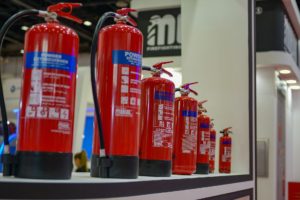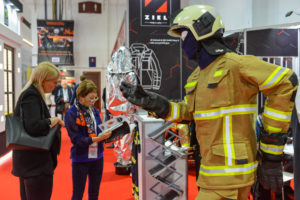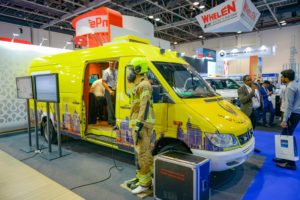Middle East Commercial Security Market To Be Worth US$8.4 bn By 2025, Says Research
The Middle East’s commercial security market will be worth US$8.4 billion by 2025 registering a 16% compound annual growth rate (CAGR) over the next two and a half decades, according to new research.
The forecast comes in a report by 6W Research, commissioned by Intersec – the region’s leading trade fair for security, safety and fire protection – organisers Messe Frankfurt Middle East. It says growth is being driven by increasing infrastructure development and stringent regulatory policies and is fuelling demand for super-smart hi-tech surveillance, access control and intrusion detection solutions.
The research shows the bulk of demand is coming from Saudi Arabia (29.9%) followed by the UAE (24.7%), Qatar (10.2%) and Kuwait (7.2%).
Headlining current demand are video surveillance systems with research pointing to huge potential for advanced technology solutions. “The segment is expected to continue its dominance as governments in the region are putting special focus on the installation of video surveillance systems across the Middle East,” says the report. “Increasing adoption of IP surveillance, video analytics, and smart storage would further push the segment growth in the coming years.”
6W Research findings are borne out by exhibitors signed up for Intersec Middle East, which will run at the Dubai World Trade Centre (DWTC) from 19-21 January 2020.
The Greek integrated IT solutions provider Terracom S.A. says cloud computing, artificial intelligence and smart technology will be key influencers for the sector. It will be at Intersec with its ground-breaking QR-Patrol cloud/mobile platform which facilitates real time management for patrol guards.
“It allows companies to monitor their premises and equipment and safeguard their lone workers,” explained Dimitrios Zacharakis, Terracom’s CEO.
“QR-Patrol’s design and functionality is based on Terracom’s long experience in security software and adopts the business logic of a Central Monitoring Station. It’s the first application worldwide to incorporate in its arsenal Internet-of-Things technologies such as beacons and wearables.”
Zacharakis believes the commercial security sector is on the verge of a massive overhaul with conventional solutions being relegated to the past. “Up to now most companies have turned to traditional systems for their security needs, entailing numerous limitations such as the lack of real-time control and instant crisis management. This offers us a great opportunity to penetrate the market using a smart real-time solution that can cover the industry’s needs.”
Also planning a regional push at Intersec is Dutch IOT platform AlarmSecur.com which integrates sensor triggered devices with CCTV to issue push alerts to phones seconds before the sensors are triggered. At Intersec, the company will launch into the region the smallest 4GG videophone which features facial recognition.
AlarmSecur.com’s CEO Roderik van der Touw says the sector’s future will be dominated by super-smart solutions. “This will be a growth in device integration with video and more video analytics and AI, like facial recognition,” he explained. “There is simply more demand for reliable, and high-resolution video security.”
Dubai’s own video management software provider Digifort says the commercial security sector is already experiencing total transformation. “Far beyond traditional video security, the new wave of artificial intelligence and application solutions based on deep learning, are helping us to make better sense of the skyrocketing data we are faced with today. This new level of proactive response is set to help change the future of video surveillance operations,” explained Tooma Chong, Director of Digifort Pty Ltd.
At Intersec, Digifort will demo its latest 7.3 VMS technology as well as facial recognition, video analytics and audio solutions.
Technology convergence for future security needs will be high on the agenda at the Intersec Intelligence Forums 2020 which features conferences, workshops, roundtables and live demos.
“The Intersec Future Security Summit will track the sector’s transformation when experts analyse critical security threats, examine security loopholes in business ecosystems and discuss how cutting-edge technologies can be tailored to meet evolving security requirements,” said Andreas Rex, Show Director at Messe Frankfurt Middle East. “As the first Intersec of the new decade, it’s appropriate to dig deep into the dynamics of the smart technology, including AI and ICT, which will inform how we are all kept safe in the workplace of the future.”
Commercial Security will be the second largest segment represented by exhibitors at Intersec, hosting an expected 375 out of the 1,200 organisations on the show floor in January next year. Fire and Rescue will form the largest section with more than 430 exhibitors, followed by Safety & Health (140 exhibitors), Information Security (120 exhibitors), Homeland Security & Policing (90 exhibitors), and Physical & Perimeter Security (50 exhibitors).
More information is available at: www.intersecexpo.com











 Email: info@cyber-gear.com
Email: info@cyber-gear.com